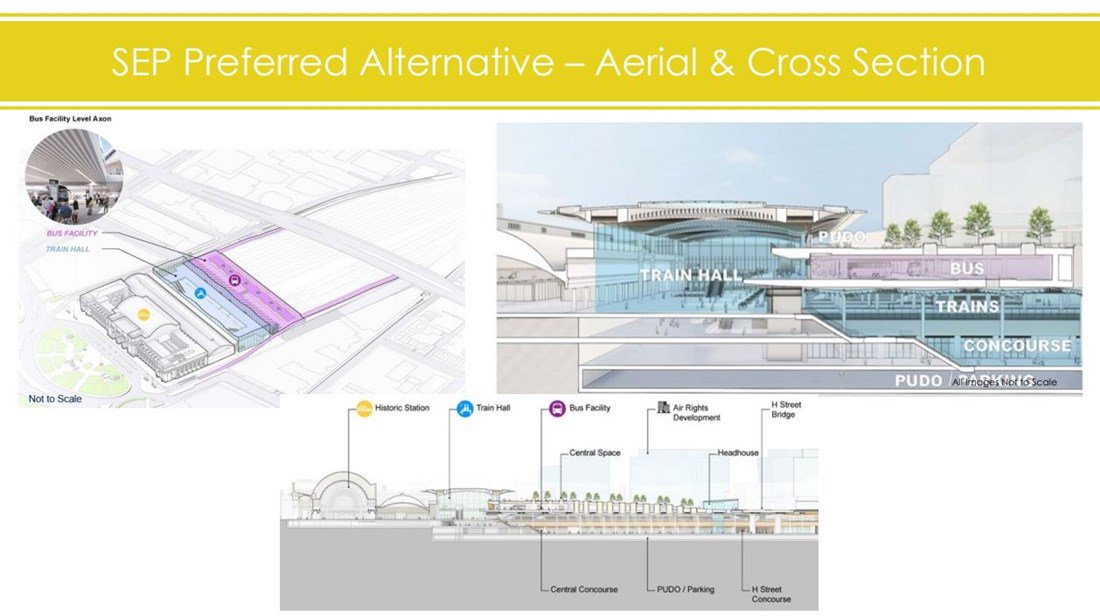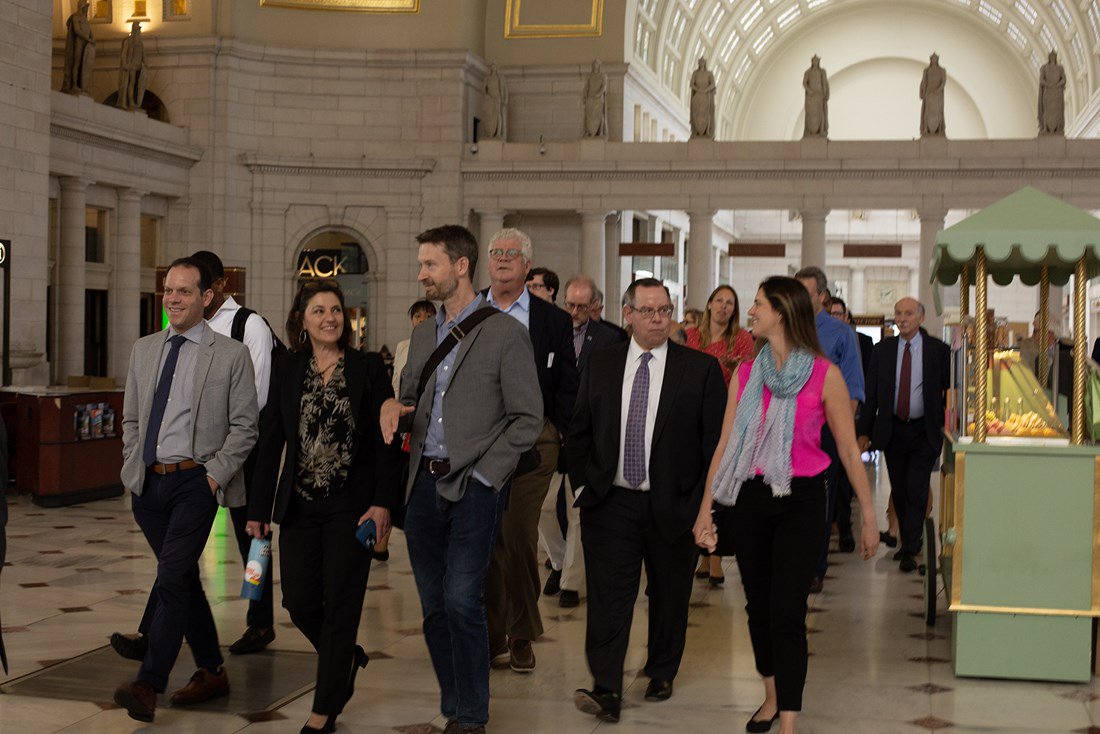As federal funding opportunities to strengthen and enhance the nation’s transportation network are made available through the Infrastructure Investment and Jobs Act (IIJA) and the Inflation Reduction Act (IRA), officials on the COG Board of Directors are collaborating closely to ensure metropolitan Washington is well-positioned to receive and optimize these investments.
Federal infrastructure dollars, coupled with regional funding, will be key to the long-term success of Union Station, located in Washington, D.C. and serving as metropolitan Washington's multi-modal transit hub for over a century. The station is currently planning a transformative redevelopment.
COG Board reviews federal funding opportunities for infrastructure upgrades
The June COG Board of Directors meeting focused solely on transportation funding opportunities and plans to expand and improve the region’s railway system, with briefings from the U.S. Department of Transportation (USDOT), the U.S. Federal Railroad Administration (FRA), and the Union Station Redevelopment Corporation.
“The Biden-Harris Administration is ready to follow through on our promise to deliver results to rebuild roads, bridges, ports, airports, upgrade public transit and rail systems, and deliver better and safer infrastructure,” said Ann Shikany, U.S. Department of Transportation Deputy Assistant Secretary for Policy, adding that the metropolitan Washington region has already received over $340 million in infrastructure grants since November 2021 when President Biden signed the IIJA, also known as the Bipartisan Infrastructure Law.
Current projects in the region supported by federal infrastructure funds include rehabilitation of the I-395 Northbound bridge over the Potomac River, construction of a South Capitol Street trail to extend the Anacostia River Trail Network, improvements to the New Carrolton Metro Station to improve connectivity to MARC and Amtrak, and awards to multiple area jurisdictions for Safe Streets for All, a $5 billion grant program to support regional and local projects that aim to prevent roadway deaths and serious injuries.
Shikany shared that additional grant application processes have begun for programs addressing charging and fueling, resiliency, innovative mobility solutions, safety (including another round of the Safe Streets for All program), and more.
COG is working to support the region’s transportation agencies as federal funding becomes available. In addition to tracking opportunities and facilitating interjurisdictional collaboration, COG can also apply for grants on behalf of jurisdictions, a tool that may be helpful as the District of Columbia and federal government work on a legislative fix for current terms that deemed the District ineligible for the Safe Streets for All program.
Union Station redevelopment seeks to transform region’s multi-modal transit network
The board was also briefed on plans to redevelop and expand Union Station, the region’s multimodal transportation hub.
“This is the second busiest inner-city rail hub in the country, and it’s our objective and goal to create a station worthy of the nation’s capital. This will enable growth and mass transportation options, and the benefits that come along with that, such as environmental and economic development goals,” said Doug Carr Union Station Redevelopment Corporation President & CEO.

Following the meeting, Carr led board members on a tour of Union Station, which allowed them to receive an “on the ground” perspective of areas slated for improvement at the station.
Redevelopment of the station envisions reconstruction of tracks and platforms, improved internal circulation space and amenities, and expansion to accommodate higher levels of train service and improve the connectedness of the region’s rail systems (including Amtrak, MARC, and VRE). All investments could be supported by forthcoming federal grant programs for infrastructure and improve the long-term viability of Union Station, which has experienced declining retail occupancy, layout inefficiencies, and residual impacts of COVID-19 on ridership levels.
“We know that there’s a lot of interest in the D.C. region for run-through service, such as having MARC trains connect into Virginia and VRE to connect into suburban Maryland, which could be facilitated through expansion… current track and platform layouts create challenges for run-through service,” explained Jennifer Mitchell, U.S. Federal Railroad Administration Deputy Administrator.
The State of Maryland and Commonwealth of Virginia have signed a Memorandum of Understanding committing to work together to find ways to make run-through service a reality for the system. In 2020, the Transportation Planning Board at COG published a study that explored the market potential for run-through service between the MARC and VRE commuter rail systems.

COG Board members tour Union Station. (COG)
“This is a century-level type of investment. It’s not just a regional opportunity, it’s a regional responsibility… as a region, we all have a lot at stake here, I hope we all see the different levers we can push,” said COG Board Vice Chair and District of Columbia Councilmember Charles Allen.
In the coming months, COG Board members will also look to coordinate with regional and federal partners to find a solution to the Washington Metropolitan Area Transit Authority’s looming funding deficit. COG helped the region forge consensus on capital funding for Metro in 2018 along with public, private, and civic sector partners.
Board members are hopeful that with a unified commitment as a region, and active participation from the federal government, a long-term funding solution for WMATA and other regional transportation priorities can be achieved.
“I want to take the rosiest outlook that it’s not only a seat at the table, but an active part of the solution,” shared COG Board Member and Arlington County Board Chair Christian Dorsey in response to the USDOT commitment to working with area leaders to ensure the long-term success of the region’s transit system.
Additional infrastructure investments, new resource announced
In addition to the previously awarded grants discussed at June’s meeting, additional funding opportunities continue to be announced and awarded. On June 26, the Federal Transit Administration (FTA) announced the recipients of the latest round of Low/No and Bus/Bus Facilities grants stemming from the IIJA. In metropolitan Washington, WMATA, the University of Maryland, Alexandria, and Loudoun County received a total of $182 million in grant support for their respective projects.
The funded projects include obtaining battery-electric and/or compressed natural gas (CNG) buses and associated needs (such as charging and fueling stations), utility upgrades, workforce development programs, and facility overhauls. Each project seeks to advance the region towards meeting long-range climate goals.
COG is supporting the efforts of our members and partners to pursue these new funding opportunities by providing access to information and identifying regional priorities. During the board meeting, staff unveiled a new online resource—two searchable databases providing information on more than 400 IIJA funding programs and more than 100 IRA funding programs.